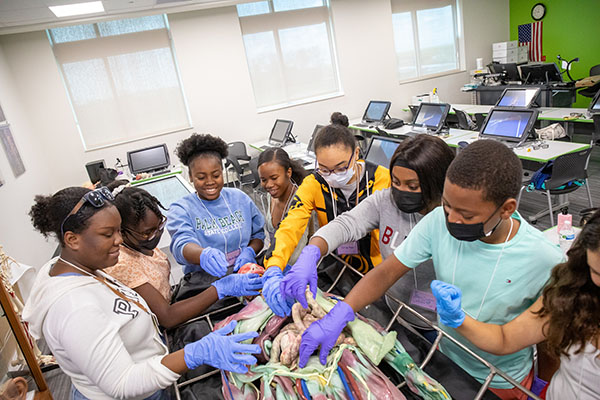A citizen science event was held June 16 at Palm Beach State College’s Loxahatchee Groves campus to expose underserved high school juniors and seniors to science, technology, engineering, arts and mathematics (STEAM) disciplines and programs.
The event, titled “Think Like a Researcher, Act Like a Researcher,” was funded through a $5,000 National Library of Medicine grant. It featured hands-on science and humanities activities, including isolating DNA from strawberries; “Dodgy Monkey,” an active exercise in physics; and “St. George on a Bike,” an arts and technology project in which students contributed to an artificial intelligence caption model to generate information about European artwork.
Participants also explored the campus Anatomage Table led by PBSC professor Dr. Vetaley Stashenko and watched a presentation on the All of Us Research Program from the National Institutes of Health that aims to make advances in tailoring medical care to the individual.
More than 50 students attended from Everglades Prep, Palm Beach Lakes High School, John I. Leonard High School and Lake Worth High School. Partners and presenters at the event were the University of Florida’s Scripps Biomedical Research campus and its Institute of Food and Agricultural Sciences.
“I am a big fan of citizen science because it allows students to engage in real-world problems actively and deeply,” said Iris Fiallos-Finstad, PBSC librarian and professor on the Belle Glade and Loxahatchee Groves campuses who helped organize the event. “It exposes them to new disciplines and does not discount their contributions and insights. For some students, this may be their magic bullet to finding a career path in STEAM.”
Those who were invited to the event were identified through PBSC’s TRIO Educational Opportunity Center. Fiallos-Finstad hopes the college will host another citizen science event in the future.
Citizen science is the collection and analysis of data relating to the natural world by members of the general public, typically as part of a collaborative project with professional scientists. For more information, visit www.citizenscience.org.








